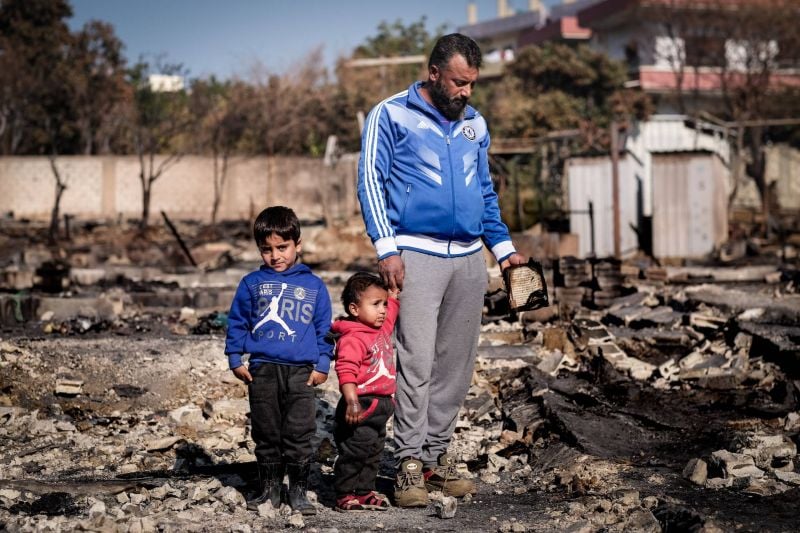
A Syrian refugee camp near Tripoli after a fire. Dec. 30, 2020. (Credit: João Sousa/L'Orient Today/File photo)
BEIRUT — Syrians in Lebanon are under increased social pressure Tuesday, a day after North Lebanon’s governor announced a “ban” on gatherings and restrictions on free movement.
Governor Ramzi Nohra’s announcement was the latest in a string of public statements by officials in Lebanon that risk exacerbating tensions two weeks following the killing of Pascal Sleiman, a Lebanese Forces (LF) official in Jbeil. An initial investigation by the Lebanese Army accused a Syrian gang of committing the crime.
The accusations stoked public anger toward Syrians in Lebanon. Videos emerged on social media last week of Jbeil residents, including LF supporters, beating up Syrians. L’Orient Today could not independently verify the content of the videos.
The Lebanese Forces said in a statement last week that it considers the killing a “political assassination” until proven otherwise. Hassan Nasrallah of Hezbollah, which some Lebanese had accused of carrying out the killing, denied last Monday that the party had any role.
An estimated 1.5 million Syrians live in Lebanon, the country with the largest refugee population per capita in the world. Around 800,000 of them are UN-registered refugees.
The past year has seen Lebanese officials increasingly call for them to go home.
Following Sleiman’s killing, videos shared on social media show what appeared to be people shaving the hair of a person with facial bruises whom social media users claimed was Syrian. Other videos of alleged attacks on Syrians also spread on social media. The videos could not be independently verified.
The LF itself condemned the alleged incidents in a statement on April 11, calling them "barbaric acts to which some Syrians are exposed," while still calling for Syrian refugees to leave the country.
‘Banning’ Syrians?
Nohra's statement called for a "ban on all gatherings of displaced Syrians, efforts to control their movements, and immediate reporting of any suspicious acts to carry out the necessary investigations."
Nohra wasn’t alone. Immediately following the arrest of Syrian nationals in connection to the murder of Lebanese Forces official Pascal Sleiman, several municipalities enforced bylaws that restricted the movement of Syrians, and several Syrians in Beirut told L'Orient Today that they felt too threatened by deteriorating security conditions on the street to leave their homes.
As part of Nohra’s statement on Monday, he also requested a census be conducted to record displaced Syrians living there, with procedures established for updating it.
The new slew of measures follows a previous crackdown in October, when caretaker Interior Minister Bassam Mawlawi announced harsher measures against irregular Syrian migrants. He called on the security forces to "stop motorbikes driven by Syrians who do not have a residence permit."
Mawlawi also urged governors, mayors and mukhtars (village- and neighborhood-level officials) to apply a "categorical ban on accepting donations … linked to displaced Syrians" and asked the governorate of Beirut to "combat begging in the capital" — a phenomenon for which some allege Syrian networks are responsible.
The head of the Free Patriotic Movement (FPM), Gebran Bassil, joined other figures in echoing those demands on Monday, calling for the deportation of Syrian migrants who "violate Lebanese and international law."
Bassil said that the FPM had proposed deporting Syrians who enter the country through illegal crossing points or who leave and re-enter Lebanon through legal points having previously acquired refugee status. The party also said it wished to deport any Syrian laborer who violates the labor law, removing their "displaced person" legal status.
“In this context, Lebanese officials’ heinous scapegoating of the refugee population is especially alarming,” Ramzi Kaiss, a researcher for Human Rights Watch in Lebanon, told L’Orient Today. The proposed new measures risk “further fuelling violence against Syrians in Lebanon, many of whom live in a state of continuous fear over being arrested, deported, beaten, harassed or threatened solely because of their nationality.”